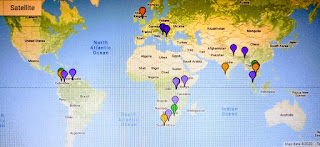To Beat COVID-19 Pandemic Use Scientific Facts!
THE INDEPENDENT |
"The COVID-19 pandemic is testing health care and disaster management systems of countries and the agility of policy responses to effectively handle a public health catastrophe. Since the first reported case in Africa on February 14, countries in the region have responded to the disease with varying levels of success, with many countries taking the lead in various ways. For example, on March 4, Nigeria was the first African country to sequence the SARS-CoV-2 genome. South Africa is now leading the continent in testing per capita—27,485 tests per million people as of July 1—currently ranked 19th globally.
According to the American research Group, Brookings Institute, from Cape Town to Cairo, many countries have seized the opportunity to combine both existing emergency health care protocols and innovation to improve response effectiveness, from building affordable ventilators to using digital and emerging technologies for tracking and other economic activities.
In a recent report, Brookings, shared some of the outstanding responses to COVID-19 from the region to derive key insights and important opportunities from the responses, and recommend policy actions for moving forward.
Necessity is spurring great innovation across Africa. In Senegal, researchers developed an immune-based diagnostic test for COVID-19 available for only $1 while engineering students built a multifunctional medical robot to lessen the load on health care workers. Ghana has also produced a low-cost COVID-19 antibody test currently undergoing regulatory reviews. Kenya converted existing factories to mask production, with a production target of tens of millions. Other African countries quickly followed with the countries with stronger manufacturing capabilities coming out on top.
The breakdown of supply chains has offered opportunities for e-commerce solutions. Rwanda, for instance, was able to go cashless because of its high level of preparedness for a digital economy. Notably, to reinforce barrier and distancing measures, the government of Rwanda waived transaction fees on mobile payment transactions while mobile companies further optimised features on mobile payments.
Ghana is using Zipline drones to take samples to testing sites. In a good example of reverse engineering, the United States is also using Zipline drones for similar tasks after successful pilot programs conducted in Africa. Rwanda has used locally assembled drones to increase awareness through in-flight public broadcasts, and robots to screen and monitor COVID-19 patients.
Right now, 297 million learners in Africa are out of school because of the pandemic. As a result, Kenya, South Africa, Egypt, and Morocco, alongside many other countries, have launched e-learning platforms in partnership with national broadcasters, telecoms, and private players. However, while maintaining and increasing access to education is a vital step during the pandemic, it is too early to tell if students are actually learning.
More needs to be done.
Given the continent’s weak medical systems, many have turned to other solutions. Several African countries such as the Republic of the Congo, Guinea-Bissau, and Tanzania have ordered and received shipments of Madagascar’s COVID-19 organic “remedy;” notably, the World Health Organization (WHO) and the Africa Centers for Disease Control and Prevention (Africa CDC) have offered to support the design of a study to test the efficacy of the organic product. Pursuant to this matter, the Malagasy government (as the primary sponsor) has since registered a clinical trial to test the efficacy of the product (now in capsule form) on a Pan African Clinical Trials registry.
Contextual data modeling has been impactful.
Data modeling assists governments in predicting the evolution of the pandemic against the prescribed confinement and de-confinement measures. It can also provide innovative solutions for Africa’s context. For example, to counter the limited availability of diagnostic test kits, Rwanda adopted mathematical modeling to implement a pool testing method that reduces the number of tests required for an accurate infection count.
The South African government proactively set up a National COVID-19 Modelling Consortium as the primary source for all COVID-19-related projections. A Ph.D. student there developed an intuitive web-based COVID-19 dashboard to share real-time updates on the pandemic in South Africa and other countries.
Key lessons for Africa
Given these success stories, Brookings highlights important lessons that emerge from their assessment. They point at decisive leadership that stands on sound and contextual scientific, economic, and social advice, not political expediency, is key to accelerate containment and recovery. That full lockdowns are not sustainable in Africa for periods longer than a couple of weeks, even with some social protection, African countries with strong local manufacturing capabilities will recover faster, and willingness to adopt and deploy new technologies has been to Africa’s advantage, but this should be more systematic, and more funding should be made available toward the improvement of Africa’s indigenous plants research and clinical trial capacity more generally.
Brookings also makes policy recommendations for governments, including putting in place sustainable, early response mechanisms supported by an innovation-friendly regulatory framework, sound infrastructure, and adequate funding."







Comments
Post a Comment